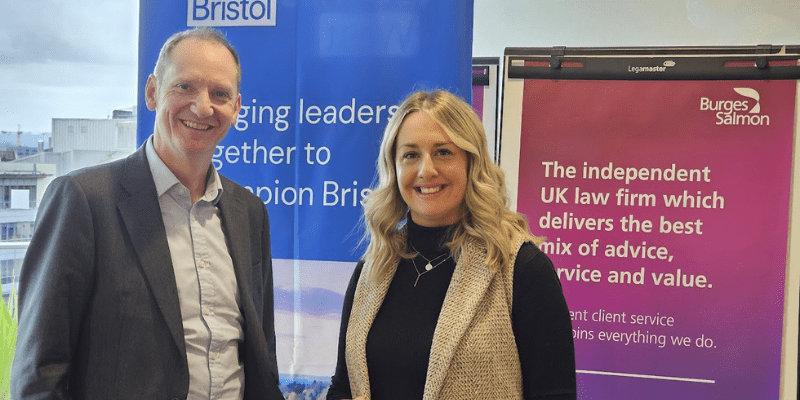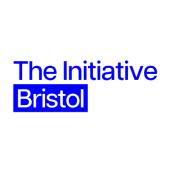
Last week, business leaders from the Bristol Initiative membership came together to discuss ESG – Environmental, Social and Governance. We were kindly hosted by Initiative member and leading UK law firm Burges Salmon at its fantastic offices in Temple Quarter. Also present were business leaders from The Bristol Port, Hargreaves Lansdown, GWR, EDF, The Grand Appeal, JLL, Babbasa, Socius, Arcadis and Stride Treglown.
The event opened with a short introduction from Victoria Matthews, our Bristol Membership Director who set the scene for the aims of the roundtable. This was followed by a short presentation from Mike Barlow at Burges Salmon on how Burges Salmon has embraced it across both its business operations and the work it delivers for its clients, with Mike also pointing to the challenges, and opportunities, that comes with embracing ESG principles. Mike commented: “Increased awareness of, and engagement with, ESG will continue to gain momentum, particularly with the EU Corporate Sustainability Reporting Directive coming into force in 2024. This will impact UK companies with large operations in the EU, and for many businesses, this will be the first time ESG information has been formally integrated into management reporting. We understand that ESG is an area where real competitive advantage can be gained and, we’ve leveraged our ESG expertise, to develop tools, including an ESG Risk Review, ESG Corporate Disclosure Tool, Modern Slavery Statement compliance check and an ESG Pensions Tool, to provide comprehensive support to help clients manage ESG risks and realise the opportunities. Understanding the place ESG lawyers have in the future, we also rolled out a training programme to support our lawyers, this has proved ground-breaking in empowering our people to engage authentically with our clients around ESG.”
Through our discussions several points became clear – that for most businesses the E in ESG, Environmental, was taken as a given. Everyone in the room was working towards becoming a more sustainable business, and all the businesses were also looking to reduce their carbon footprint in future – with some setting ambitious targets, including our host Burges Salmon who is working towards a Net Zero ambition by 2026, and Stride Treglown looking to achieve net zero carbon by 2030.
Some businesses in the room however had challenges to overcome in their net zero journey. Many in the room are working with older, more traditional assets, such as the Bristol Port and their van fleet or GWR and their diesel trains, and the cost of replacing these high emissions vehicles, particularly in the current economic climate, is proving challenging, without support and funding from the government.
We heard from Mike Dodd, Development Director at Socius, who talked about how they had recently certified as a B Corp, and had introduced a new social charter for their partners that encouraged creation of social impact within the communities that they do business. Unfortunately, they have had some unwilling partners, or some that have just seen ESG as a tick-box exercise – a sentiment that many around the table had experience of.
Martha Girling, Responsible Business Manager at Hargreaves Lansdown, made an excellent point that the S in ESG – Social – is often left behind for the easier to quantify environmental work. It can be hard to put numbers and data behind social projects, and many in the room expressed their enthusiasm for wanting to do more on this. Several people in the room mentioned partnering with local schools to support their communities.
While discussing social value and social impact, Matt Rogers from Babbasa and Helen Haskell from The Grand Appeal, two organisations directly involved in social impact and change, talked about the difficulties they faced . For Helen, the big change she has seen lately is businesses opting for volunteering support, something The Grand Appeal cannot offer, in favour of financial support. We believe this is driven by increasing requirements for companies to demonstrate that they are providing volunteering opportunities rather than simply making donations.
Matt from Babbasa introduced the roundtable to the Our City 2030 programme, which he and Babbasa are heavily involved in. The programme is working with Business West and the Bristol City Office and aims to support young people from low income households, starting from inner city Bristol, to secure a median salary role by 2030. If you would like to read more about how you can support Our City 2030 you can read this blog from Matt here.
To close out the session, Mike from Burges Salmon asked us all what pushback they had received when trying to work on their ESG policies and procedures and many around the room stated the same things – foreign partners who are not on the same page, or clients and partners who say they want to step up and do something but then do not. Everyone around the table agreed that ESG was essential, but we also acknowledged that in many ways the room was a bit of an echo chamber and one of the biggest challenges right now is getting through to the unwilling or to those who think ESG work is just a phase.
If you are a member of the Bristol Initiative and you would like to host a roundtable like this on a topic of your choosing, contact jenny.ablett@businesswest.co.uk and if you are interested in joining the Bristol Initiative so you can take part in fantastic high-level discussions like this then please contact initiative@businesswest.co.uk
- Log in to post comments

The Bristol Initiative
Want to know more about the benefits of being an Initiative member and who can join? Click the button belw to get in touch.

